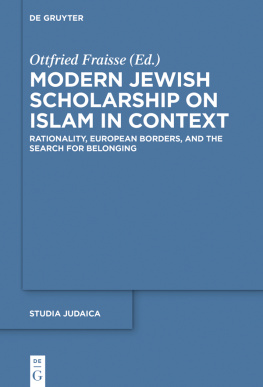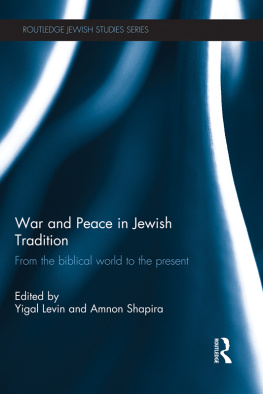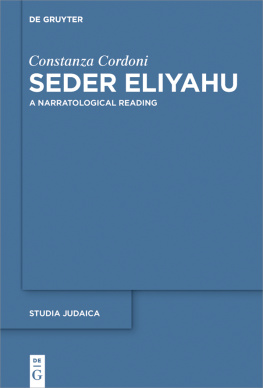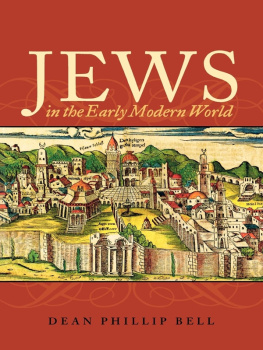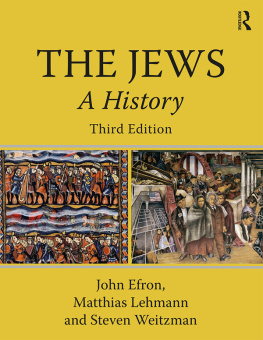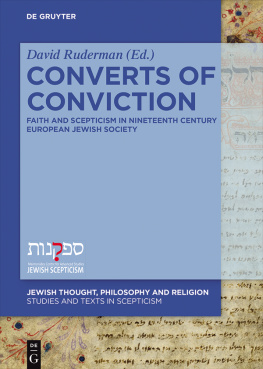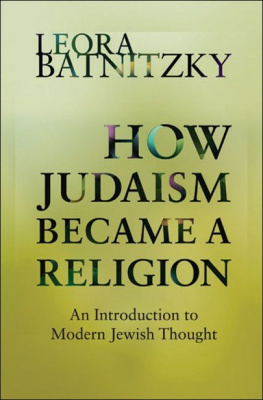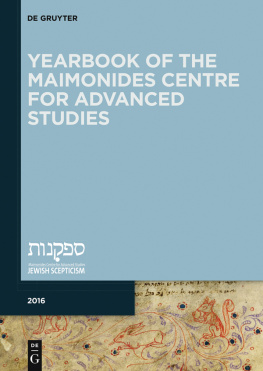Table of Contents
Guide

Modern Jewish Scholarship on Islam in Context
Studia Judaica

Forschungen zur Wissenschaft des Judentums
Begrndet von
Ernst Ludwig Ehrlich
Herausgegeben von
Gnter Stemberger, Charlotte Fonrobert,
Elisabeth Hollender, Alexander Samely
und Irene Zwiep
Band 108
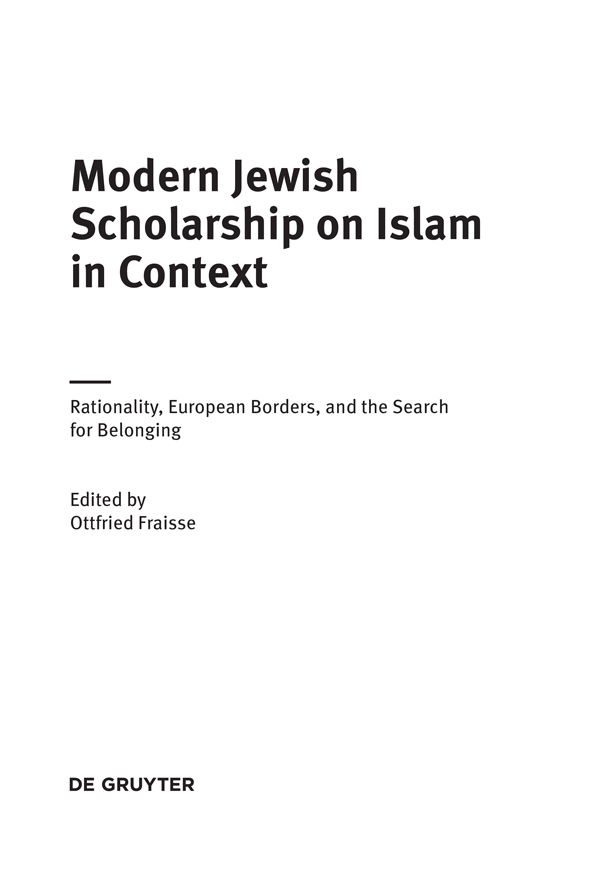
ISBN 978-3-11-044491-9
e-ISBN (PDF) 978-3-11-044689-0
e-ISBN (EPUB) 978-3-11-044609-8
ISSN 0585-5306
Library of Congress Control Number: 2018960712
Bibliografic information published by the Deutsche Nationalbibliothek
The Deutsche Nationalbibliothek lists this publication in the Deutsche Nationalbibliografie; detailed bibliografic data are available on the Internet at http://dnb.dnb.de.
2018 Walter de Gruyter GmbH, Berlin/Boston
www.degruyter.com

Acknowledgements
This volume derives from a conference held in Frankfurt in 2014. I would like to express my heartfelt gratitude to Christian Wiese for his tremendous support instrumental in bringing this conference to Frankfurt, including the assistance provided by Grazyna Jurewicz and Ansgar Martins from the department he chairs. I am also especially grateful to Recha Allgaier-Honal, Felix Hedderich and Anna Grochocka for meticulously applying the guidelines of the style sheet to all articles submitted. I wish to thank Bill Templer for translations and proof-reading services that are as always of an extremely high standard. My thanks also go to an anonymous proof-reader who made valuable comments on all the articles. The conference and the publication of the volume would not have been possible without the generous support of the Research Training Group Theology as an Academic Discipline at the Goethe University Frankfurt, the Union of Friends and Promoters of the Wolfgang Goethe-University and the International Office at the same university. Last but not least, I wish to thank the publisher and the editors for including this volume in the series Studia Judaica. Above all, I owe a debt of great gratitude to all the contributors to this volume, whose suggestive papers I found very stimulating for refining my own thinking and with whom it was a truly great pleasure and honor to work.
July 2018
Ottfried Fraisse
Ottfried Fraisse
Modern Jewish Scholarship on Islam in Context: Rationality, European Borders, and the Search for Belonging
The following collection of articleswith two exceptionsoriginates from a conference Beyond the Myth of Golden Spain held at Frankfurt University in July 2014. The imagery of Golden Spain was extensively evokedalthough not inventedby those West European Jews in the eighteenth and nineteenth centuries who wanted to gain more political and social recognition in Western societies. They promoted the imagery of Golden Spain in order to distance themselves from the traditional Ashkenazic educational system, rabbinic leadership, and mode of worship as then especially prevalent in Eastern Europe. But how do the scholars of Jewish origin who about between 1830 and 1930 researched Islam in quite great number, and in an exceptionally profound and sustainable manner, fit into this research narrative?
Did these scholars still accept the European borders as their implicit frame of reference and tacit subject of research or did they, in the wake of their research on Islam, develop an awareness of the epistemic and power-political implications of the European borders (of course a question highly indebted to Edward Said)? If so, what did those researchers of Jewish origin learn about the impact of the European borders on their scholarship when dealing with their non-European objects of study? It would be highly topical to come to know more about their experiences with the changing epistemological presuppositions depending on whether living within or outside the European borders, because in a global perspective the urgency of recognizing the mechanisms of their, from a European point of view, highly self-interested ways of representation is evident. In the following introduction, I would like to substantiate the claim that the research on Islam by those scholars of Jewish origin is an enlightening body of texts providing different strategies for dealing with the epistemological and power-political properties of the European borders depending on thereal or imagineddirection of gaze.
The research field of Western study of the East (the Orient) in general and Islam in particular has received growing attention in the last 75 years. Especially in recent decades, a mounting number of studies have appeared that offer multiform surveys of this research field with either biographical, disciplinary or institutional outlines. How did the discipline of Orientalism in the last 40 years come to grips with this attribution that it was serving as an instrument to colonize the East?
This double-layered notion of Orientalism thus generated an identity crisis, especially within the ranks of those who wrote historiographical surveys of Middle Eastern Studies, which they dealt with in very different ways. On the one hand, those who wanted to write a disciplinary history of Orientalism ( Orientalistik ) still believed that scholarship on the East is a distinct scientific discipline like physics or biology; on the other, they found their field entangled in a complex of all-embracing political suspicions. It does not come as a surprise that some of the disciplinary histories which had appeared even decades after 1978 simply ignored Saids Orientalism and its central role in triggering what has come to be known as postcolonial studies and subaltern studies. One reason why it took about 30 years until the historiographies of the field of oriental studies also included Saids most fundamental claims was certainly his radical, even paradoxicaland polemicalreinterpretation of the notion of Orientalism.
1Retroactions on Edward Saids Original Notion of Orientalism
Saids Orientalism not only accelerated a paradigm shift towards postcolonial theory but its innovation retroacted on Saids original concept itself. Not least it was this process of adjustment of Saids most fundamental claims which promotes a fruitful rapprochement today between Saids train of thought and the methodologies applied in the historiographies of the research on the Middle Eastern Islam undertaken by scholars from a Jewish background.
Many critics observed a latent contradiction in Saids argumentation that on the one hand, he heavily criticized the stereotyped binarism of East and Westthe West as creative, progressive and intelligent, the East stylized as uncreative, static and sensualon the other, his preferred methodology occasionally seemed to paradoxically strengthen this prejudgement. This impression could arise because Said came to the conclusion that the Western image of the orient is pure imagination and not supported by historical reality. It was Saids extensive recourse to Foucaults theoretical apparatus which encouraged this kind of monolithic and ahistorical description, because it is a basic assumption of the latters post-structuralism that language as a function of power only produces representations in order to obtain an advantage of power and not to reflect a historical reality as well. Another aspect which had a quasi-essentializing effect on Saids concept of Orientalism depends on its claim of an all-inclusive extension from Antiquity up to the present. It is unconvincing to just claim a diachronic Western tradition of Saidean Orientalism , as if it were merely a reproduction

